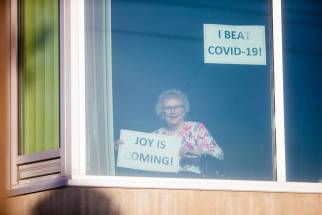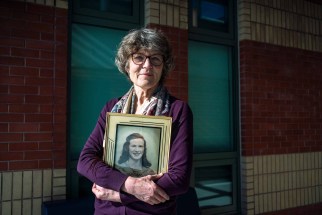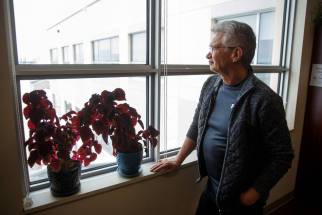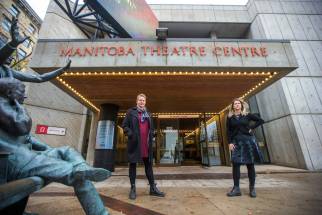‘From here, my heart’ Wally Chartrand is keeper of the spirit at Ma Mawi. Others call him elder. The voice of many teachings prefers the humbler shkabeh, ‘being a helper’
Read this article for free:
or
Already have an account? Log in here »
To continue reading, please subscribe:
Monthly Digital Subscription
$0 for the first 4 weeks*
- Enjoy unlimited reading on winnipegfreepress.com
- Read the E-Edition, our digital replica newspaper
- Access News Break, our award-winning app
- Play interactive puzzles
*No charge for 4 weeks then price increases to the regular rate of $19.00 plus GST every four weeks. Offer available to new and qualified returning subscribers only. Cancel any time.
Monthly Digital Subscription
$4.75/week*
- Enjoy unlimited reading on winnipegfreepress.com
- Read the E-Edition, our digital replica newspaper
- Access News Break, our award-winning app
- Play interactive puzzles
*Billed as $19 plus GST every four weeks. Cancel any time.
To continue reading, please subscribe:
Add Free Press access to your Brandon Sun subscription for only an additional
$1 for the first 4 weeks*
*Your next subscription payment will increase by $1.00 and you will be charged $16.99 plus GST for four weeks. After four weeks, your payment will increase to $23.99 plus GST every four weeks.
Read unlimited articles for free today:
or
Already have an account? Log in here »
Hey there, time traveller!
This article was published 11/03/2022 (1368 days ago), so information in it may no longer be current.
Wally Chartrand is a spry man with salt-and-pepper hair and kind eyes that glimmer from behind his glasses.
Holding his red drawstring medicine bag with white, yellow and black ribbon sewn onto it — the colours of the medicine wheel — and an intricately carved talking stick, he leads us into a small room on the third floor of the Swan Lake First Nation office in Headingley.
Elders
As part of this series, the Free Press is asking each knowledge keeper to share a story that is important to Indigenous culture. Wally Chartrand shares Turtle teachings:
You know how the turtle has seven main points, meaning the tail, the body, the head, and the four legs. So the tail represents that fire of long ago and how it is that the fire for us as Indigenous people almost went out at one time, and the reason is because of colonization, because when the Europeans first came to Turtle Island they brought their own ideals and beliefs, and they thought their ways were better than ours.
So, at one time here on Turtle Island, for us to practice our traditions or culture or ceremony was looked down upon. In some cases it was forbidden, and in some cases even against the law. So what the old people would do is when the sun would go down in the evening, they would go away from their villages, away from prying eyes and ears, and that’s where they would go and hold their ceremonies. That’s how they barely kept that fire alive.
As part of this series, the Free Press is asking each knowledge keeper to share a story that is important to Indigenous culture. Wally Chartrand shares Turtle teachings:
You know how the turtle has seven main points, meaning the tail, the body, the head, and the four legs. So the tail represents that fire of long ago and how it is that the fire for us as Indigenous people almost went out at one time, and the reason is because of colonization, because when the Europeans first came to Turtle Island they brought their own ideals and beliefs, and they thought their ways were better than ours.
So, at one time here on Turtle Island, for us to practice our traditions or culture or ceremony was looked down upon. In some cases it was forbidden, and in some cases even against the law. So what the old people would do is when the sun would go down in the evening, they would go away from their villages, away from prying eyes and ears, and that’s where they would go and hold their ceremonies. That’s how they barely kept that fire alive.
The body (of the turtle) represents the fire of today.
So they say today that fire, it’s getting stronger, because more of our people are returning to ceremony, and more of our young people are also returning, trying to find who they are and where it is that they come from. But it’s not just our own people. Today, it’s very common for us to see those other three tribes — the white nation, the Black nation, the yellow nation — at our ceremonies. So today that fire’s getting stronger.
The head represents the fire of tomorrow, and how it is now our responsibility to ensure that the fire will never go out again, meaning it’s up to us to pass on that knowledge, those teachings, those ceremonies, the songs, the knowledge of the medicines, and all those types of things, so that the fire will never go out again.
The legs of Mother Turtle represent the four sacred directions, those four seasons of life: childhood, adolescence, adulthood and elderhood. And the old people, they tell us today that there’s something wrong with that circle, and what they mean by that is the children. We’re not teaching them the seven sacred laws: love, respect, honesty, humility, courage, wisdom and truth. We don’t teach them, and that’s why from time to time we open the paper and we see that somebody took somebody’s life. Our young people they’re growing up not respecting that life ‘cause they haven’t been taught.
The youth, they call that the fast life; today that’s what they’re living, they’re living the fast life. Today, they don’t have time anymore to go and listen to those teachings and those stories from the elders ‘cause they’re too busy on their electronics and so on, so today they don’t have that time, and the parents, some of them, have forgotten their roles and responsibilities and that’s why we’re seeing their children and youth growing up in foster homes, cause they’ve forgotten their roles and responsibilities.
We say that our children are a gift from the Creator. What happens when somebody gifts you something — you’re supposed to look after that, right? But some of our parents have forgotten that.
Some of our elders, some of them are being stingy — they’re being stingy with that knowledge, meaning that they’re not passing it on the way they were meant to. So, the elders, they tell us that’s part of what’s wrong with our circle today. They say all we have to do to make it strong again today is four things.
No. 1: We have to teach our little ones those seven sacred laws early.
No. 2: We have to find a way to slow down our youth, so that they’ll go and make that time, they’ll go and listen to the teachings and the stories.
No. 3: We have to wake up our parents, so they realize, ‘Hey, these are gifts, I’m supposed to look after this gift. I have a role and responsibility.’
No. 4: All we have to simply do is open the doors and simply start inviting our elders back, cause they’re waiting for us. They’re waiting so that they can come and teach us and share their stories.
They say if we do those four things, just those four things, we’ll begin making the circle strong once again. That’s that Turtle teaching, she represents truth when we talk about the seven teachings. In that sense, that’s our truth.
He begins to lay out seven smooth stones, which have been painted red, in a turtle formation.
“This is one of the Turtle teachings I was talking to you about,” he explains.
His voice is soft and measured, like a deep, soothing whisper. It matches his calm demeanour. He points to one of the stones, a grandfather, and he begins to share a teaching that was passed onto him years ago.
“It represents that fire of long ago. And how it is that this fire for us as Indigenous people went out at one time…”
Chartrand has shared this Turtle teaching and many others to countless people over the years. These teachings don’t belong to him, or to anyone for that matter, he says. They are meant to be shared and passed on so that others can learn from them.
Chartrand is the keeper of the spirit at Ma Mawi Wi Chi Itata Centre. The room in Headingley is a Ma Mawi branch office. The agency has other knowledge keepers and elders on staff, but he is the only one with this title. In the spirit of reconciliation, the Free Press is beginning a new series profiling knowledge keepers in the Indigenous culture.
As the keeper of the spirit, Chartrand’s role is to connect people of all ages through the more than 60 programs offered by Ma Mawi. He participates in and facilitates everything from learning and training opportunities to sharing traditional teachings and being in ceremony.
“It’s about helping to bring relationships together in a healthier, stronger way,” he says of his role, which falls under the executive management team at Ma Mawi.
Chartrand was first hired in 1999 under the umbrella of the Aboriginal Healing Foundation, a program to help residential school survivors.
Any group that received funding had to have a committee of elders. The group initially held a sharing circle once a month at KeKiNan Centre, an assisted living centre in Point Douglas. The elders talked about the loss of identity, culture, traditions and spirituality after 150 years of residential schools, but most damaging was the ability to be in relationships.
The sharing circles helped Chartrand shape the project’s focus — trying to mend and rebuild relationships. His team at Ma Mawi developed men’s, women’s and family retreats that focused on relationships, using a simple format of yesterday, today and tomorrow.
In the yesterday aspect, participants were asked how they learned to be in relationships — whether through aunties, uncles or their broader community — and what was healthy about them.
In the today aspect, participants were asked how they viewed their current relationships, as a partner, a parent, with extended family and in the community, and to focus on what was healthy and what was not.
In the tomorrow aspect, participants were given tools for building healthier, stronger relationships.
“I see myself as being a helper– a helper from here, my heart.” – Wally Chartrand
“We called it a code of honour. It was simple; that we’re respectful for one another, that we protect and provide for our families. It was just simple concepts, and it was really up to them on whether or not they wanted to utilize those tools and skills. Part of that was the belief coming in that our families, our communities, our moms and dads — that nobody’s broken, and if somebody’s not broken they must have some skills, some strength and some talent, and how do we build on those?”
The Aboriginal Healing Foundation program operated for 12 years, until funding ran out. Chartrand returned to working in the child welfare system, where he had worked previously, until four years ago, when he rejoined Ma Mawi.
He is a knowledge keeper, a traditional pipe carrier, a sweat lodge holder and a sun dancer, though he humbly and graciously declines to be called an elder because he doesn’t feel as though he’s earned that right yet, even though people often label him as one.
Maybe one day. For now, he is comfortable being called shkabeh, which means helper at ceremony.
“I see myself as being a helper — a helper from here, my heart,” he says, placing his hand on his chest.
“Because they say when we do things from our heart, that’s part of being in ceremony as well.”
A member of Key First Nation in Saskatchewan, Chartrand grew up near Dauphin. He was raised by his great-kookum — Anishinaabe for grandmother — and his mother who was in and out of his life, depending on her circumstance.
His “kookoo,” as he calls her, was a devout Catholic, but she didn’t have blinders on, he says. She would take him to gospel jamborees as well as to traditional Indigenous ceremonies. To this day, he says, he loves gospel music.
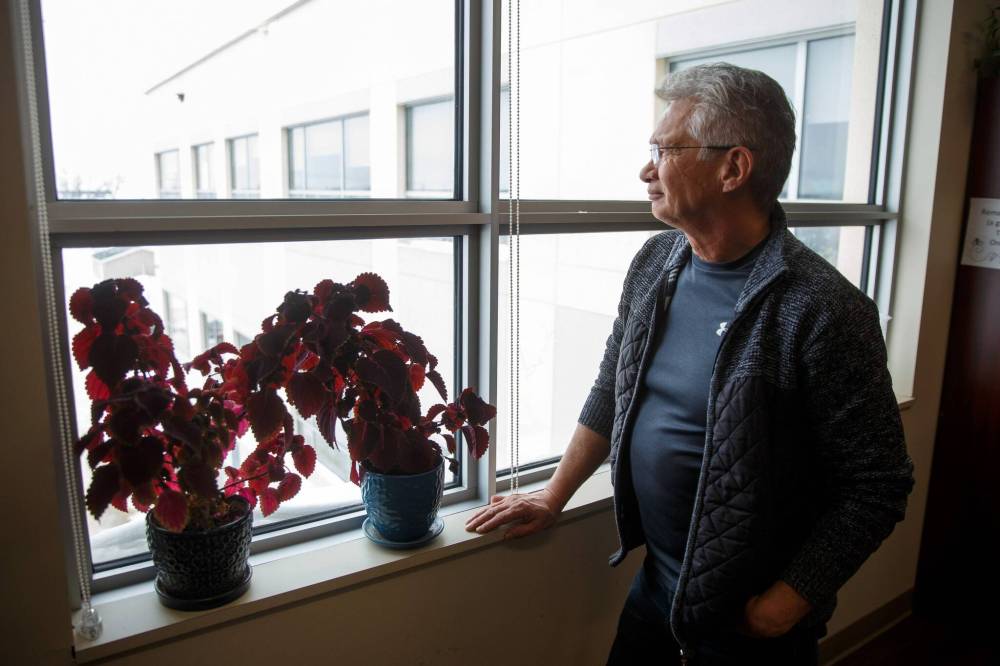
Chartrand has never met his father, a Portuguese man whose name he’s always known, but nothing else. Not knowing his dad has played a big part in who he has become. Early on, even before he started dating, he decided that if he ever got to be a father he would not be like his own. If he ever had children, he would be a part of their lives no matter what.
“I don’t know if my dad had been a part of my life how that would have affected me — but here’s what I do know: there came a time in my life where I had to emotionally, you know, spiritually tell my dad, I missed out. I wish I could have had a relationship; I wish he could have been there,” he says.
“But also, part of me was like, ‘You could have had that relationship’ had he chosen otherwise. That’s not for me to carry. In a lot of ways, I’ve forgiven my dad in whatever decisions he made, but it doesn’t mean that I forget.”
Fatherhood is one of Chartrand’s greatest joys. He has seven kids — his oldest is 41 and the baby is 16 — and five grandchildren. Behind the joy, there is grief. Two contrasting emotions permanently intertwined for Chartrand. He lost three of his children: a son who died when he was 10 months old in 1982, a 21-year-old daughter who died from an overdose in Toronto seven years ago, and his 34-year-old daughter, mother of three of his grandchildren, who died by suicide last May.’
“I always tell people that when I pray for others I pray to the creator, when I pray for me I pray to my kookoo, my son and my daughters now.” – Wally Chartrand
“Her partner had gotten killed two months prior — murdered — and it just broke her heart,” he said softly. “I don’t think she could see beyond the decision.”
Chartrand is a man strong in his belief and in the teachings that he has been gifted. Of our ancestors, or relatives who have gone ahead to the spirit world, they don’t always leave us completely, he says.
“I always tell people that when I pray for others I pray to the creator, when I pray for me I pray to my kookoo, my son and my daughters now. That’s who I pray to for me, ‘cause I always believe they’re still there somewhere, listening and hearing.”
When he was young, Chartrand would listen to his kookum tell stories in Ojibway. Recounting the stories of his childhood, Chartrand’s eyes glimmer when he goes back to that place in his mind, where he is a little boy sitting on the floor of their home absorbing the stories. Fresh, warm bannock and tea accompanied the conversations and teachings, many of them are long forgotten, or foggy, or asleep inside of him, but they’ll pop up every once in a while.
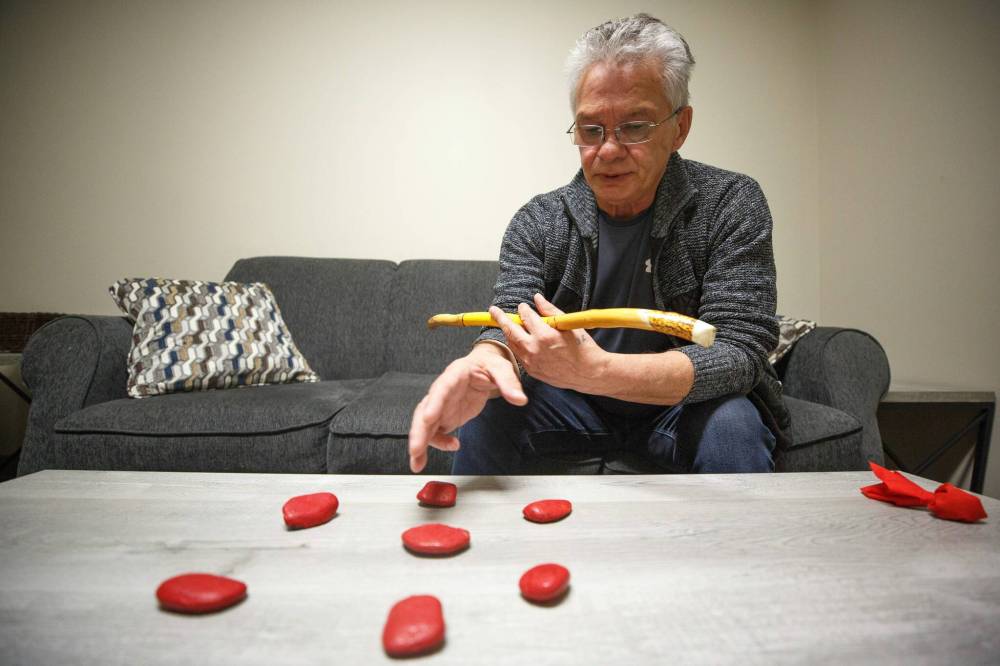
In 1979, Chartrand attended his first sweat in Roseau River. For 20 years, he walked on and off the path of living a traditional way of life. In 1999, he stopped veering from the path and became committed to his walk and to helping others in their walks through ceremony and sharing teachings.
“One of the things that I’ve appreciated about our Indigenous culture when it’s related to spirituality, is I’ve still yet to go to a ceremony where they’re belittling or downplaying Christianity. Instead, the outlook and how we view Christianity is that if it works for some people, then that’s awesome. That’s a good thing. It works for them. So, that’s what I’ve really appreciated about our Indigenous community,” he says. “If you flip it around, that’s part of how this whole residential school era started — to Christianize us.”
Chartrand says he is still learning. The only way to do that is to listen and ask questions, and to share the teachings and knowledge that have been gifted to us.
“There’s a song that’s called the Bear Song, in that song the words are Manidoo Mukwa, which is Creator Bear translated. But what that song is actually translated to, it’s speaking to those grandmother and grandfather spirits, asking for directions. And those grandmother grandfather spirits are all our relatives that have gone ahead of us already — So, in our Indigenous ways, when we speak a name of an animal, it doesn’t necessarily mean literally that animal. But there’s other meaning that comes with that. That’s part of what I love about our traditions and our culture and that,” he says.
“For example, that rattle when we shake it… To us, we hear the rattle sound, but that’s their language. They understand exactly what that rattle is speaking to, and the same is with that drum. When you beat that drum… da-dum-da-dum-da-dum… that’s what we hear, but again, that’s their language. They understand exactly what that drum is saying. And the same goes with the songs we’re singing, we hear the chanting part, sometimes we’ll pick up a word or two, but again that’s their language, they understand exactly what we’re saying.”
“Our spirits understand all languages, they understand all cultures, all traditions. They understand.”
Chartrand lives in Hillside Beach with his partner, Theresa. He describes himself as a homebody who likes beading, and spending time with his family. He feels most comfortable in nature because that’s where he says his spirit gets healed. He is an easy-going adventure seeker. He loves getting into his old Ford van, called Delilah, and going someplace with no destination in mind.
“When I started walking back this way in 1999, one of my mentors, this elder, he said, ‘You know what? This walk you wanna do,’ He said, ‘go over here, go and learn. Go over there and go and learn. Go over there and go and learn. Take what you like, leave what you don’t like. Don’t make the mistake of just going to one,’ he said. Cause here’s the thing, if you just go to that one, that person’s only a human being.”
“He (a mentor) said, ‘go over here, go and learn. Go over there and go and learn. Go over there and go and learn. Take what you like, leave what you don’t like. Don’t make the mistake of just going to one.’” – Wally Chartrand
Chartrand says it’s important to create an opportunity to listen and share stories, as well as document them. It’s part of keeping our fire alive, though he understands that some elders may be leery of sharing for fear of people taking and manipulating stories for their own gain. He can only speak to his own experience.
“You know what they tell us — on a dark, clear night, you look up into the heavens and you count the hundreds upon hundreds, upon hundreds of stars out there. They say that’s how many teachings there are, just on the circle of life teaching,” he says. “That’s only one aspect and I barely know any of those teachings — so in that sense, I know a little bit and I am willing to share the little bit that I know.”
Shelley.cook@freepress.mb.ca
Twitter @ShelleyAcook
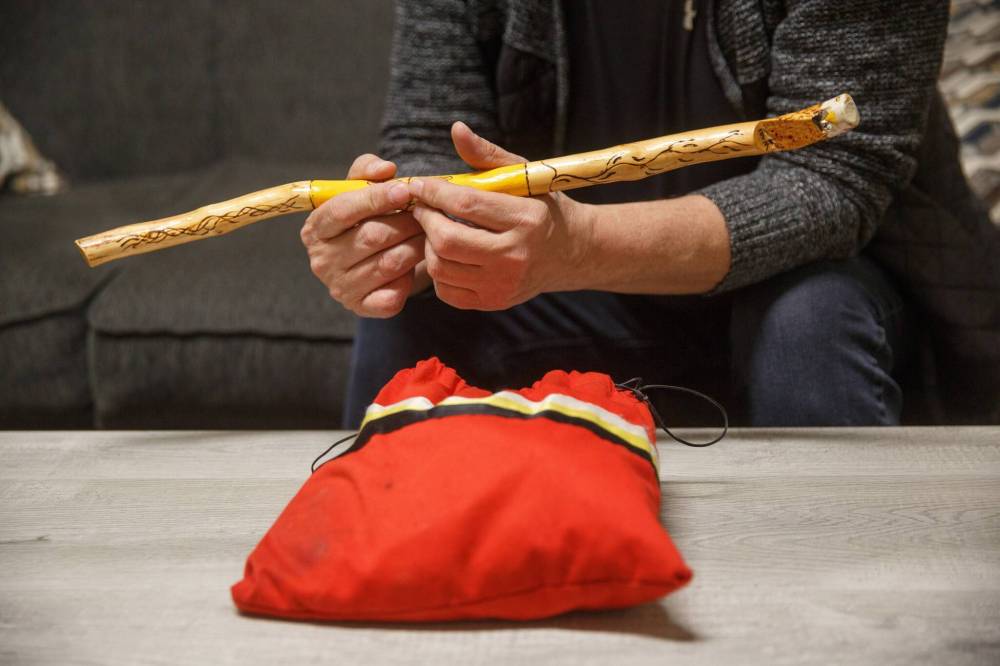

Our newsroom depends on a growing audience of readers to power our journalism. If you are not a paid reader, please consider becoming a subscriber.
Our newsroom depends on its audience of readers to power our journalism. Thank you for your support.


